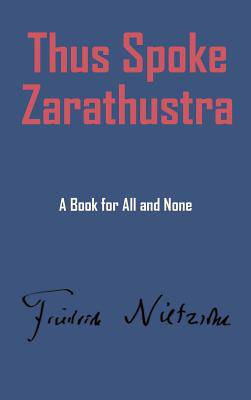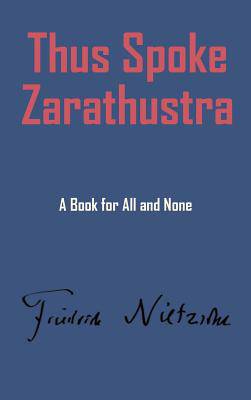
- Retrait gratuit dans votre magasin Club
- 7.000.000 titres dans notre catalogue
- Payer en toute sécurité
- Toujours un magasin près de chez vous
- Retrait gratuit dans votre magasin Club
- 7.000.000 titres dans notre catalogue
- Payer en toute sécurité
- Toujours un magasin près de chez vous
Description
Thus Spoke Zarathustra is one of the most analyzed thus misunderstood philosophical book. It is not widely known that Nietzsche was also a born mystic. He did not write about Christ or Buddha but he chose to write about the much fictionalized Zarathustra with recurring themes like Superman. Hitler who most likely never read this book but had heard about it and took the concept of the Übermensch to a new direction. Hitler and the Academics have been missing the true mystic undercurrent of this masterpiece where man is just a bridge between the animal and the Übermensch, the self-realized man. Friedrich Nietzsche developed his philosophy during the late 19th century. He owed the awakening of his philosophical interest to reading Arthur Schopenhauer's Die Welt als Wille und Vorstellung (The World as Will and Representation, 1819, revised 1844) and admitted that Schopenhauer was one of the few thinkers that he respected, dedicating to him his essay Schopenhauer als Erzieher (Schopenhauer as Educator), published in 1874 as one of his Untimely Meditations. Since the dawn of the 20th century, the philosophy of Nietzsche has had great intellectual and political influence around the world. Nietzsche applied himself to such topics as morality, religion, epistemology, psychology, ontology, and social criticism. Because of Nietzsche's evocative style and his often outrageous claims, his philosophy generates passionate reactions running from love to disgust. Nietzsche noted in his autobiographical Ecce Homo that his philosophy developed over time, so interpreters have found it difficult to relate concepts central to one work to those central to another, for example, the thought of the eternal recurrence features heavily in Also sprach Zarathustra (Thus Spoke Zarathustra), but is almost entirely absent from his next book, Beyond Good and Evil. Added to this challenge is the fact that Nietzsche did not seem concerned to develop his thought into a system, even going so far as to disparage the attempt in Beyond Good and Evil.
Spécifications
Parties prenantes
- Auteur(s) :
- Editeur:
Contenu
- Nombre de pages :
- 372
- Langue:
- Anglais
Caractéristiques
- EAN:
- 9781940849409
- Date de parution :
- 09-11-15
- Format:
- Livre relié
- Format numérique:
- Genaaid
- Dimensions :
- 152 mm x 229 mm
- Poids :
- 666 g







